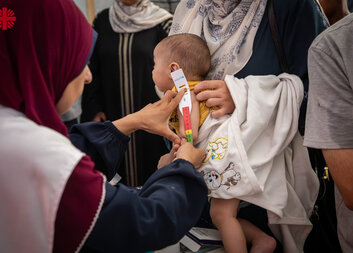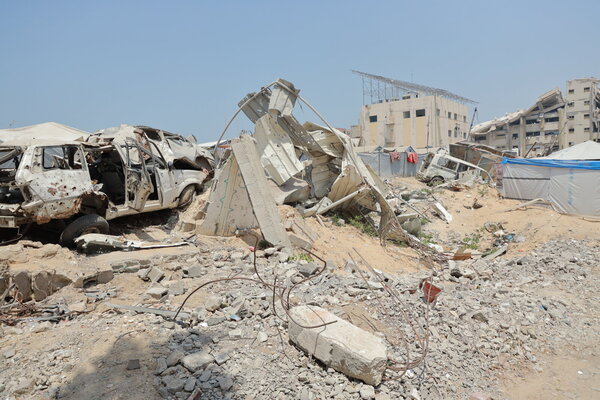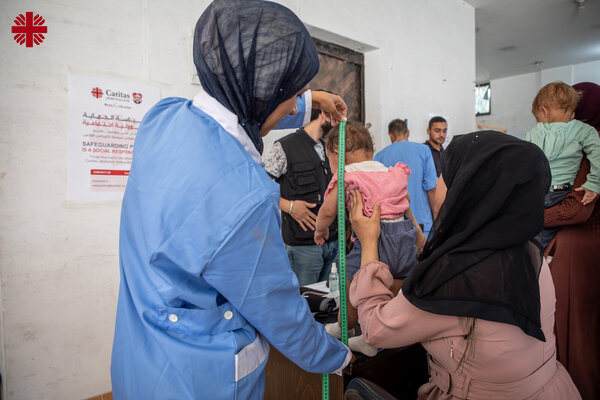The situation in Gaza has deteriorated dramatically in recent weeks, and the humanitarian crisis continues. People face ongoing displacement, attacks, food shortages and uncertainty about what the next day will bring. Despite the expansion of the Israeli military offensive in Gaza City and the worsening security conditions, Caritas Czech Republic remains active, continuing to support the most vulnerable.
Slow and inaccessible journey south
Staff from Caritas Czech Republic primarily coordinate social assistance and work directly with individuals and families in need. In cooperation with local partners – Caritas Jerusalem and the Palestinian organisation Sawa – we are also providing basic healthcare, distributing medicines, and offering crisis intervention through a 24/7 helpline. However, the work of humanitarian staff and medical professionals is increasingly complicated by security risks. Movement to safer areas is time-consuming, dangerous, and often financially out of reach. Journeys that once took minutes now take an entire day. Roads are frequently blocked, or people simply cannot afford the cost of travelling “to safety”. Many no longer believe that any place in Gaza can truly be considered safe. The southern part of Gaza, where people are trying to flee, is overcrowded with displaced families living in inadequate conditions.
When residents receive warnings that their building will be targeted, they often evacuate immediately. The Israeli army is bombing high-rise residential buildings in Gaza City, prompting people to try to save whatever essentials they can. Based on previous experiences of displacement, they know how difficult it is to obtain new supplies – especially now, as winter approaches. People rush outside with whatever they can carry, throwing mattresses and blankets out of windows onto the street. They try to salvage clothing, bedding, shoes – items that were once taken for granted but are now nearly impossible to find. Basic necessities are lacking. People are physically and mentally exhausted.
Famine and daily struggle to survive
In August, experts from an independent United Nations panel confirmed the outbreak of famine in Gaza City. At that time, up to half a million people were facing acute food shortages, and it was anticipated that the situation would worsen in September, spreading famine to other parts of Gaza. The global Caritas network, Caritas Internationalis, described the crisis not as a tragic accident, but as the result of a deliberate strategy to destroy human lives.
Famine here is not a natural disaster, but the outcome of a deliberate strategy: blocking aid, bombing food convoys, destroying infrastructure, and denying basic needs,
the organisation stated. Caritas Internationalis is calling not only for an immediate ceasefire but also for unrestricted access to humanitarian aid, an end to civilian starvation, the release of hostages, protection of the population, and accountability for crimes committed.
At the end of August, the Israeli army began gradually occupying neighbourhoods in Gaza City. A full evacuation of the city was ordered soon after, with approximately one million people still present at the time. In mid-September, a large-scale ground offensive was launched, aimed at destroying the military infrastructure of the Hamas terrorist organisation. Dozens die daily as a result of attacks. Those who remained or had recently lived in Gaza City are surviving in the ruins of buildings or in makeshift tents, without access to sanitation, clean water or electricity. The lack of clean water is contributing to the spread of disease, particularly among children, who are suffering from digestive issues, skin infections and respiratory problems.
Hospitals that are still operational are overwhelmed, facing shortages of medicine and fuel. The injured are brought in on improvised stretchers or carried by relatives. According to available data, around 350,000 people have left Gaza City, although some sources report lower numbers. Many others remain, speaking of exhaustion, uncertainty and a lack of means to escape.
The war is also having a severe impact on the West Bank, where tensions continue to rise. Palestinian residents are dealing daily with military operations, road closures, movement restrictions, inspections, destruction of homes and infrastructure, and limited access to livelihoods. Education is also under threat – schools are damaged or used as shelters, preventing children from attending classes. Many are coping with deep trauma and emotional distress. Caritas Jerusalem, a long-standing partner of Caritas Czech Republic, is active in the region, working to support the most vulnerable communities under extremely challenging conditions.
Work is becoming too dangerous
Caritas Czech Republic continues to monitor the situation closely and regularly assesses the safety of its staff and the feasibility of ongoing humanitarian work. These days, the situation is so unstable and dangerous that the clinic supported by Caritas Czech Republic must suspend operations. The area where it is located is increasingly targeted by attacks.
We remain committed to providing updates on our activities and humanitarian efforts in Gaza. You can support the work of Caritas Czech Republic by contributing to the Caritas for Gaza fundraising campaign. Every donation makes a real difference in the lives of those affected. Thank you for helping us help others.
Help civilians survive this humanitarian crisis













